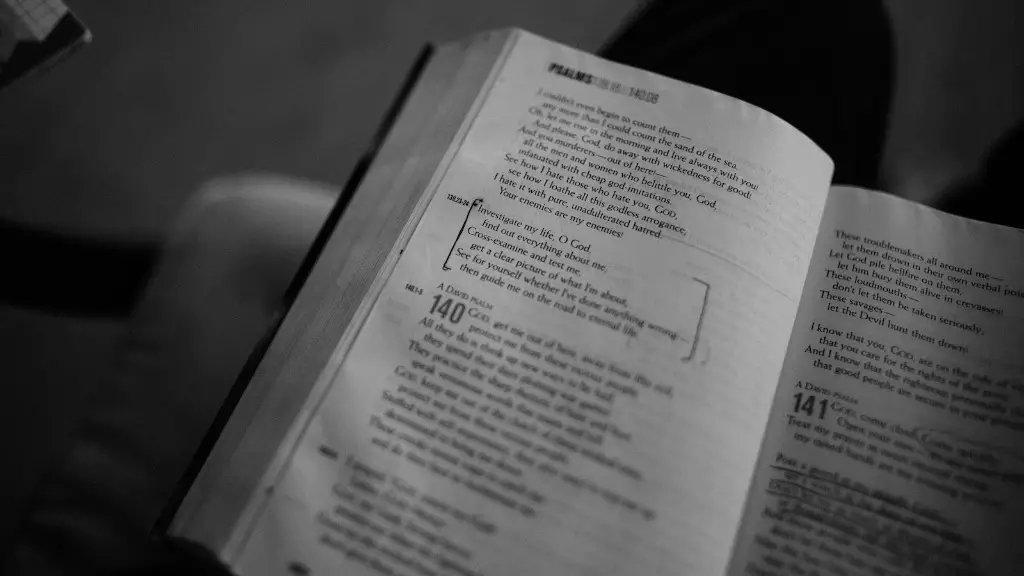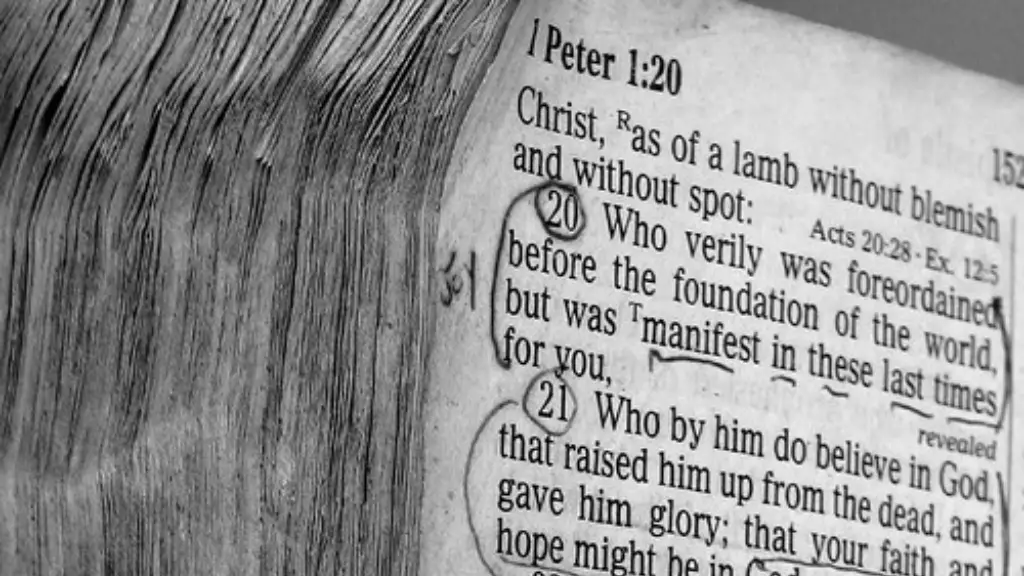Examining the Bible’s Teaching on Homosexuality
The Bible is clear on its teaching when it comes to the issue of homosexuality. In both the Old and New Testaments of the Bible, homosexuality is consistently and firmly condemned. While some interpret various Bible passages to mean that homosexuality is a sin, others argue that homosexuality can be accepted and embraced without compromising the truth of scripture. So, is being gay a sin in the Bible? In attempting to answer this question, it is necessary to examine the relevant scriptures, consider different theological interpretations, and examine the changing social context in which the Bible is read.
Relevant Scriptural Passages
Throughout the Bible, there are several passages which address the issue of homosexuality. In the Old Testament, there are clear condemnations of homosexual activity. Leviticus 18:22 states, “You shall not lie with a male as with a woman; it is an abomination.” This passage is further reinforced in Leviticus 20:13 “If a man lies with a male as with a woman, both of them have committed an abomination; they shall surely be put to death; their blood is upon them.” In the New Testament, Paul’s letters to the churches in Corinth and Rome both admonish believers to resist and shun homosexual practices, characterizing homosexual acts as “dishonorable passions” and “unnatural” (Romans 1:24-27).
Theological Interpretations
Various theologians have offered different interpretations of what these passages mean. Some interpret the passages as condemning all homosexual behavior, regardless of the context or consent of the parties involved. On the other hand, there are those who argue that the passages refer only to certain practices, such as promiscuous or coercive behavior, which are not acceptable in any context. For example, some interpret the words of Paul in Romans to refer to heterosexuals engaging in homosexual behavior for pleasure and exploitation, and not necessarily to mutual, consenting relationships.
Many scholars suggest that the passages from the Old Testament should be seen in the context of other laws and customs which were specific to a particular culture, and are no longer relevant to society today. Some suggest that the passages should be seen as prohibitions against male domination and exploitation, rather than against homosexual behavior itself.
Changing Social Context
In recent years, there has been a significant shift in the public view and acceptance of homosexuality. Gay marriage is now legal in many countries, and homosexuals have greater rights than ever before. This social context, some argue, should be taken into consideration when interpreting the Bible’s teachings on homosexuality. It is suggested that the Bible should be interpreted in light of its original intent, allowing for a more nuanced approach which takes into account the changing, modern world.
In conclusion, it is difficult to definitively say whether or not the Bible considers being gay a sin, as there is an ongoing debate about how these passages should be interpreted. While some passages clearly and consistently condemn homosexual acts, others should be seen in light of the changing social context in which they are read. Ultimately, it is up to each individual to decide how they interpret the Biblical teachings on homosexuality.
God’s Love and Acceptance
Regardless of how the Bible’s teachings on homosexuality are interpreted, it is essential to remember the overarching idea of love and acceptance conveyed throughout the Bible. God is loving, accepting, and forgiving, and has created each one of us in his own image. It is this idea of unconditional love and acceptance which shines through the Bible, and should be embraced as the ultimate truth which unites us all.
Examining the Effects of Bible Interpretation on the LGBTQ+ Community
The way scripture is interpreted and taught has often been used as a tool for oppression by those in authority. For many in the LGBTQ+ community, the Bible is seen as a source of shame and condemnation for their identity. However, there is a growing number of theologians, activists, and ministers who are advocating for a more inclusive view of scripture and interpretation.
These individuals are championing the idea that the love of God and of one another is more important than our differences. They are also working to spread more inclusive readings of scripture, which take into consideration the experiences and voices of the LGBTQ+ community. This inclusive interpretation of the Bible is being used to further the message that all people are valuable, worthy, and deserving of love, regardless of their sexuality.
The Effects of Religious Influences on LGBTQ+ Equality
In many countries, the Church is considered a powerful voice on moral issues. As such, its teachings on homosexuality can have far-reaching implications in society. In some countries, Church teachings have been used by religious leaders and political actors to influence laws and attitudes towards the LGBT+ community. In countries where homosexuality is illegal or heavily stigmatized, this has led to pervasive homophobia, discrimination, and violence against LGBT+ people.
In other countries, the Church’s stance on homosexuality has been more progressive, and religions have actively worked with the LGBT+ community to advance LGBT+ rights. In the United States, for example, many religious denominations have advocated for equal rights and acceptance of LGBT+ individuals.
Underlying Themes in LGBTQ+ Representation
In recent years, there has been a considerable amount of progress in how the LGBTQ+ community is represented in media and popular culture. Stories which feature queer characters are being seen more and more, with these characters being shown in a more nuanced, humanizing light. These representations often reflect themes of acceptance, courage, and resilience in the face of discrimination.
It is these representations which can ultimately help shift the prevailing attitudes towards the LGBTQ+ community. By highlighting the reality of the lived experiences of LGBTQ+ individuals, media and popular culture can help foster understanding and compassion, and further the goal of equality for all.
The Impact of Social Movements on LGBTQ+ Rights
The shift in public opinion and increased acceptance of the LGBT+ community has largely been driven by social movements. Pioneering activists and organizations, such as the Gay Liberation Front, the Transgender Law Center, and GLAAD have been instrumental in advancing the cause of LGBT+ rights worldwide.
Through their relentless advocacy, activism, and grassroots organizing, these individuals and organizations have successfully worked to raise awareness, challenge discriminatory laws, and shift cultural attitudes towards LGBT+ people. In many countries, these movements have helped to ensure that LGBT+ individuals are seen as full, equal citizens, with all the rights and responsibilities of every other citizen.
The Changing Nature of Families
The changing nature of families in modern society has also had a significant impact on how the LGBT+ community is viewed and accepted. The traditional notion of a nuclear family consisting of a married, heterosexual couple and their children is being challenged as more and more families now include same-sex couples and their children. This, in turn, has led to an increased visibility of LGBT+ people in society, and a greater acceptance of the LGBT+ community.
Furthermore, with the increasing acceptance of same-sex unions, LGBT+ people are now able to legally marry, adopt, and form families of their own, furthering the message of equality and acceptance.
Conclusion
At a time when the LGBT+ community is achieving greater visibility and acceptance in society, the question of whether or not the Bible considers being gay a sin is still a source of debate and controversy. While it is true that the Bible contains several passages which condemn homosexual behavior, the interpretation of these passages is highly contested and is constantly evolving in light of the changing social and cultural context. Nevertheless, the Bible’s message of unconditional love and acceptance should remain the ultimate truth that binds us all together.




